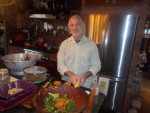Know Your Neighbor: Dr. Michael Finkelstein, Slow Medicine Doctor, Bedford

Nearly 15 years ago it appeared that Dr. Michael Finkelstein had all the ingredients for a happy and fulfilling life. He was medical director at Northern Westchester Hospital and he and his family lived in a handsome house in Bedford.
But behind closed doors Finkelstein was miserable. His marriage was deteriorating, he was failing to take the medication he would prescribe to some of his own patients, he was overstressed and suffering from chronic conditions and wasn’t spending enough time with his three children.
By chance, a donor had given the hospital seed money to launch the Center for Health and Healing of Northern Westchester to phase in integrative medicine, which may include acupuncture, Reiki and better nutrition plans, among other strategies, to be used in conjunction with conventional medicine.
That introduction to integrative medicine was one factor that began Finkelstein’s transformation and helped him reassess his life.
He would eventually leave the hospital and his practice and enroll at the University of Arizona College of Medicine and study under holistic health guru Dr. Andrew Weil.
Finkelstein, a University of Pennsylvania School of Medicine graduate, said he didn’t turn away from conventional medicine but supplemented his knowledge with alternative medicine, Eastern philosophies and a desire to grow closer to the sun and the earth and achieve a better work-life balance.
He calls the approach “slow medicine,” where a person’s health can be improved by gradually addressing issues in their life in addition to their medical needs. It’s part of the title of his book, “Slow Medicine: Hope and Healing for Chronic Illness,” published in 2013.
“We need to work on the physical but we ideally will connect the physical to all the other pieces of life–our thoughts and emotions, our relationships with other people, community, the natural world and when we do that we sort of fully cultivate the soil in which we live, where things grow,” said Finkelstein who has been a clinical assistant professor at New York Medical College for more than 20 years. “It’s not just alternative medicine, it’s really the ideal medicine to make people feel more alive.”
Finkelstein, 54, sold the house after his divorce and has lived in a converted barn on an adjacent parcel (he had right of first refusal to acquire the property) for the past 10 years. He counsels patients in his office, spending as much time asking questions about their life, who they are and what they care about, as he does on what might be physically ailing them.
Part of that transformation saw Finkelstein take a portion of the four acres, which he named SunRaven, and begin planting a wide variety of fruits and vegetables and herbs in a greenhouse and in 20 four-foot by 12-foot raised beds. Ten years ago he reached out to every contact he knew to see who wanted to join him.
Today, 21 families are signed up to help work the soil–three families a day–from March until November, and they share in the bounty. While it doesn’t provide Finkelstein, a longtime avid gardener, with all of his dietary needs, it does bring him closer to what he hoped his life would be like.
“I help people to reach the soil, which is a relatively basic recommendation,” Finkelstein said. “It’s slow living.”
His book is filled with anecdotes about patients he’s counseled and various approaches to life.
“My goal wasn’t to write a book but then I realized that I’d like to help as many people as possible.” Finkelstein said. “I can only see so many people a day, so I’d like to give a tutorial that can walk them through this process.”
Finkelstein, a Long Island native, said many of his medical colleagues admired his courage to be able to remake his life. However, there were a few who viewed his decision disapprovingly.
“There was a much smaller group of people who said what you are doing is not legitimate,” Finkelstein recalled. “When I say small, I would say maybe three or five physicians (out of 500) at Northern Westchester Hospital.”
But during the past decade, Finkelstein’s life and health have improved, and his relationship with his children, while strained a decade ago, is on solid ground.
“It’s not about throwing anything out, but it’s about being open to just about everything,” he said.

Martin has more than 30 years experience covering local news in Westchester and Putnam counties, including a frequent focus on zoning and planning issues. He has been editor-in-chief of The Examiner since its inception in 2007. Read more from Martin’s editor-author bio here. Read Martin’s archived work here: https://www.theexaminernews.com/author/martin-wilbur2007/
